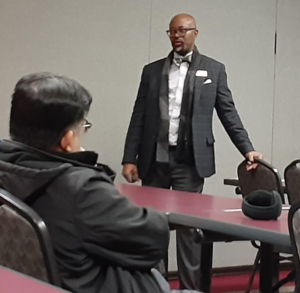There are a lot of misconceptions about Africa.
Approximately 30 people gathered in an A Building conference room to hear Kojo Quartey, president of MCCC, dispel those misconceptions in a presentation Feb. 12.

Quartey opened the event by thanking the crowd for attending and presented some of the misconceptions about Africa.
One of those is the belief African culture is homogeneous.
“There’s over 1,000 languages,” Quartey said. “There is no monolithic culture.”
In Ghana alone, Quartey said over twenty local languages are spoken and two, Twi and Ga are used prominently.
Another myth Quartey said is untrue is that all of Africa is full of wild animals like lions and zebras.
“I lived in Ghana until I was 10 years old, and I never saw a wild animal,” Quartey said. “The only time I saw a wild animal was on the weekends when my daddy took us to the zoo.”
One misconception about African wildlife that frustrates Quartey is the idea of tigers living in Africa.
“A tiger is an Asian cat,” Quartey said. “From where? Asia. Tigers don’t live in Africa, folks!”
He mentioned that African people practice a wide range of faiths.
“You have Muslims, you have people who (practice) traditional worship,” Quartey said.
He also pointed out that many believe Africans are poor, live in huts and are uncivilized.
To debunk this misconception, he showed pictures of modern cities to illustrate Africa’s development, including Accra, Ghana.
Over time, he said he’s seen more road development in Ghana.
“Roads that were two-lane streets are now major highways,” he said.
Quartey said beside improvements in the roadways, more buildings — like schools and universities — have been constructed.
“In my day, there were only three universities,” Quartey said. “Now there are multiple universities including one that is affiliated with every church — the Methodist, the Seventh-Day Adventists, the Presbyterians, the Catholics.”
After sharing information about Africa, Quartey spoke about Ghana’s Year of Return in 2019.
According to Quartey, 2019 was declared the Year of Return by Ghana’s president Nana Afuko-Addo. This meant that anyone of African descent could return to Ghana, become a citizen, and purchase and own land in Ghana.
“Africa Americans would come back, declare citizenship,” Quartey said. “Essentially it was a reclaiming, a return of those who had been stolen and sold into slavery. Now they could come back home.”
Ghana didn’t choose 2019 as the Year of Return by accident. Rather, the year had special significance to the country.
In a statement from Visit Ghana’s website, “The ‘Year of Return, Ghana 2019’ is a major landmark marketing campaign targeting the African – American and Diaspora Market to mark 400 years of the first enslaved African arriving in Jamestown, Virginia.”
Quartey mentioned that in the past, slave trade in Ghana was rampant. He said Ghana has the most slave castles than any other country in the world.
According to the New York Times, slave castles were used as a holding place for slaves before they were exported from Africa.
Now, visitors can tour Ghana’s slave castles. This allows people to learn about Ghana’s history and also benefits Ghana financially, Quartey said.
“Tourism is huge because of the slave castles,” Quartey said.
Quartey said the Year of Return was celebrated by holding festivals, summits, meals and awards ceremonies.
During Dec. 2019, Quartey said Ghana expected to host 1.1 million tourists. In the first nine months of 2019, roughly 80,000 from the U.S. and Britain visited Ghana.
Quartey showed videos of interviews from the Year of Return featuring local business people, community members and Ghana’s president Nana Afuko-Addo. Another video documented various black celebrities’ returns to Ghana including Samuel L. Jackson, Steve Harvey and Tamar Braxton.
Quartey also showed photos of his own trip to Ghana in 2019. He said he visits twice each year, once in the summer and once around Christmas.
Following the videos, Quartey ended his presentation with a question and answer session.
He asked the audience how many of them had an inaccurate view of Africa and its culture before seeing the presentation.
A few people raised their hands in response.
“That’s what these presentations are designed to do,” Quartey said. “Unless somebody shows us and tells us, we think that’s the way it is. We saw cities and we saw a whole lot of development.”
Elisabeth Brockman, student, said she enjoyed learning about Africa.
“I thought the event was very opening,” Brockman said. “It showed a lot of misconceptions and he (Kojo) clarified them.”
Anthony Quinn, director of Upward Bound, also said he enjoyed the presentation.
“It was very interesting learning about a country in Africa, seeing how modern it is (and) demystifying the myths of the countries over in Africa,” Quinn said. “You’re so used to hearing propaganda and misinformation about it. It’s good to see what it actually looks like.”
MCCC graduate Cody Crutchfield agreed with Quinn.
“It was a lot of misinformation, thinking that Africa is a single country or a single culture,” Crutchfield said. “It’s not.”
Brockman said she liked watching the videos about the Year of Return that showed African American people returning to Ghana.
“When they had people coming back that were separated, and they were making this big family, that was cool,” Brockman said.
Crutchfield also said he was fascinated by the Year of Return.
“I was interested to see how the government of Ghana has been hosting more people to come there and even own land and help improve the economy,” Crutchfield said.
For more information about the Year of Return, visit https://visitghana.com/events/year-of-return-ghana-2019/.
To view the videos that Quartey showed in his presentation, follow the links below.
https://www.youtube.com/watch?v=OxukNsiAvtY
https://www.youtube.com/watch?v=U6swpLAOyts
https://www.youtube.com/watch?v=-ie_neMCXS0
https://www.youtube.com/watch?v=tjlNR7Wyn4w
The event was first of many events to be held at MCCC celebrating Black History Month. Other events that will be held during the month, include a discussion panel on African American relationships with Native Americans on Feb. 25 and the Big Gig in the Meyer Theater on Feb. 29.

